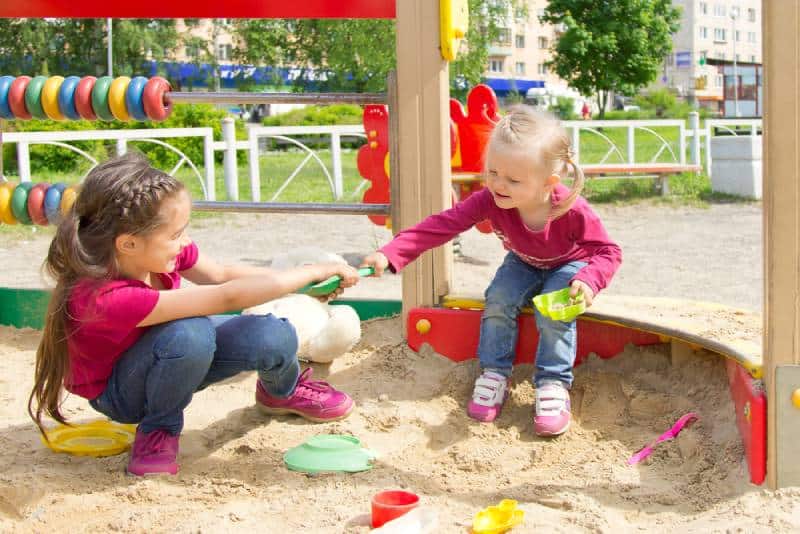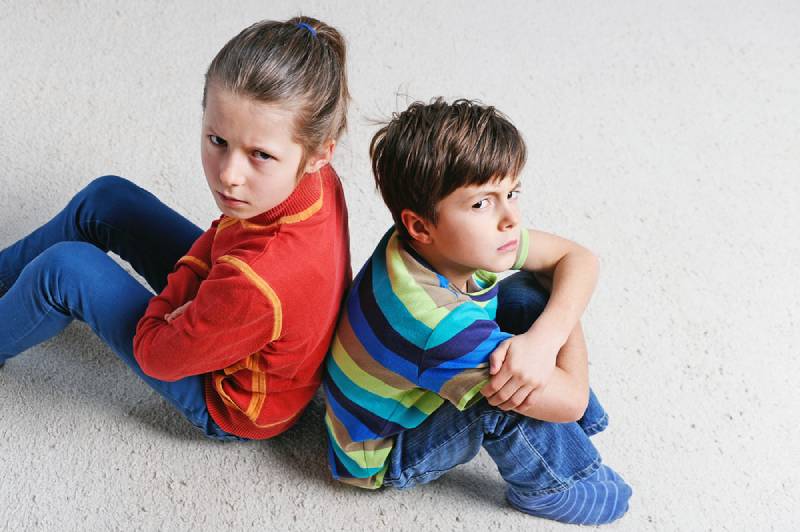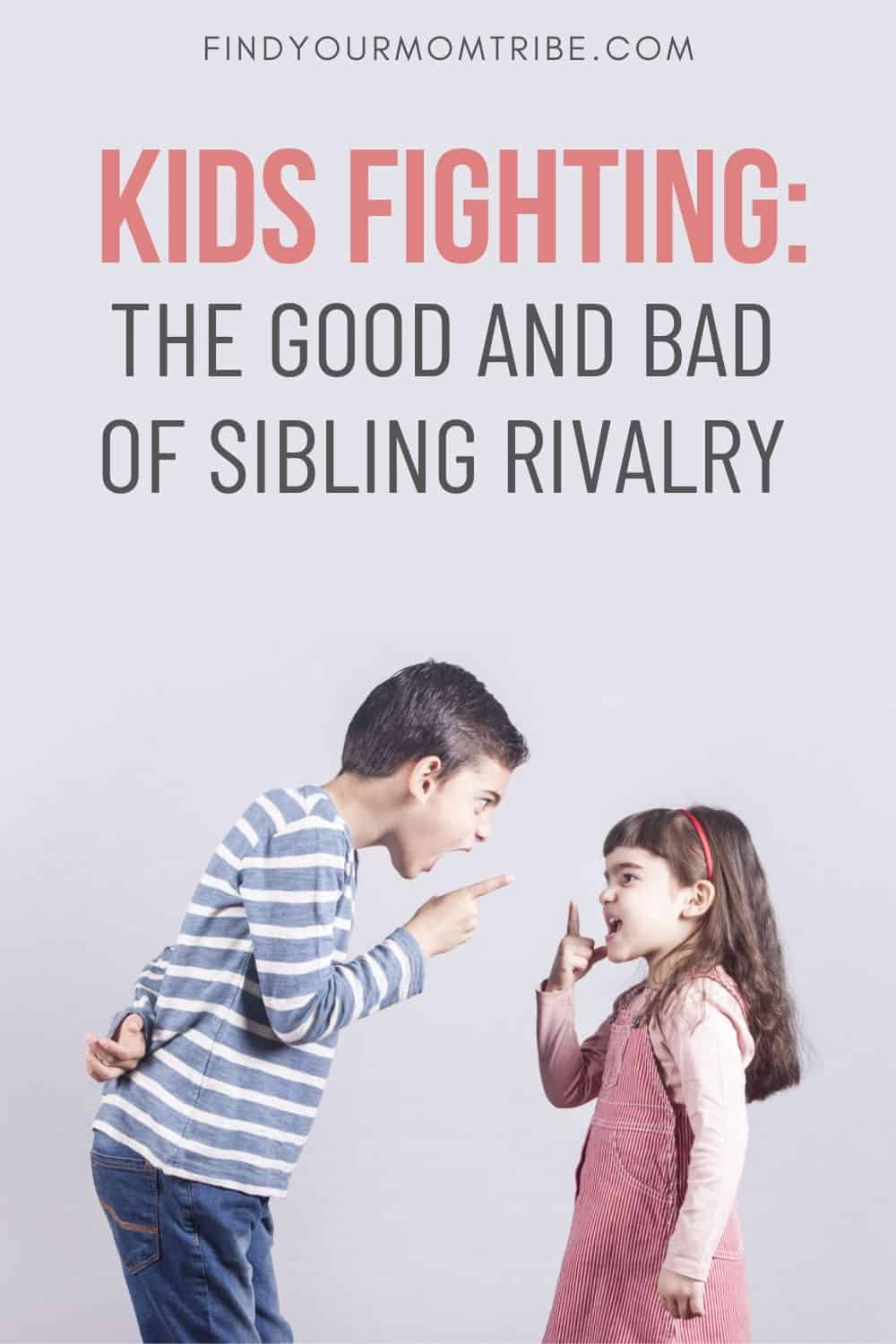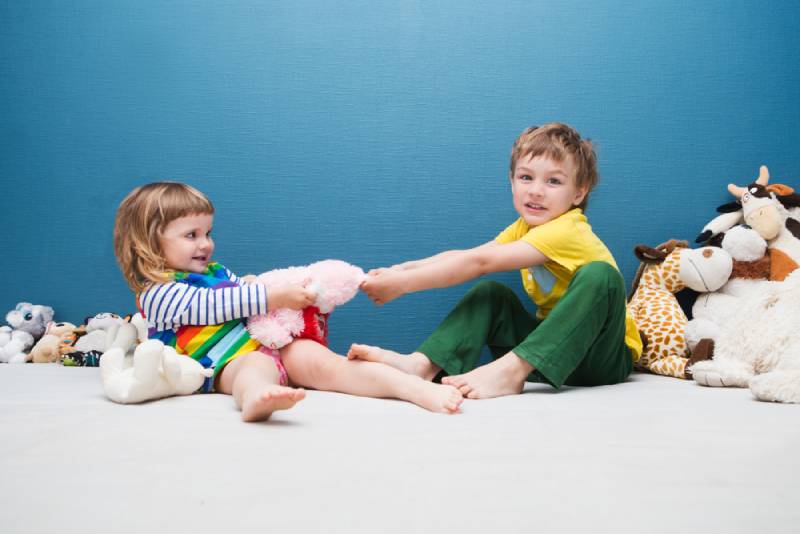Seeing your kids fighting is nothing new or unusual.
Siblings have their differences and they at times choose to exhibit it through a fight – sometimes verbal, sometimes physical.
But what can you do about it? What can you do to stop it? Should you even stop it?
Well, you do have the powers of a parent, so don’t worry too much about having the ability to put an end to it.
The real trick is to make sure it doesn’t happen again, or rather, happens less.
Why am I saying this?
Because sibling fighting is sometimes rather healthy to help your kids vent their frustrations out between each other and help them practice their conflict resolution capabilities.

But they are young and this bickering tends to often escalate to physical violence.
Someone needs to be there to mediate, to make them stop fighting.
But sibling rivalry isn’t the only form of kids fighting. Your young one might get into a squabble with other young children, which is an aspect of this that you cannot fully control.
Work together with the parent of the other child to separate them; it’s not on you to discipline the other child.
Younger kids (up to more or less an 8-year-old) tend to fight a lot more, but the closer they get to this age, they start to mature and look for other ways to work things out.
Although, this will not happen on its own most of the time; you have to nudge them in the right direction if you see them straying from this path.
How do you do this? Well, there are a number of ways.
Resolving Sibling Fights
Sibling conflicts are one of the most common forms of fighting and the ones you can actually influence on your own since they’re both your kids.
All of us with siblings can remember how sometimes it was impossible to agree with our brother or sister at times, no matter what.
My brother and I fought constantly.
Heck, I even knocked out one of his first dangling baby teeth (by accident!)
Needless to say that I was punished with no toy privileges for a week.

One among many ˝battles˝ we led in our sibling war, but we never really tried to hurt one another too often – at least not as time went along.
When we were younger we’d both just throw tantrums to see whose side mom would take, only for both of us to end up in a time-out.
See a pattern?
Bad behavior should be punished accordingly, though by no means should it be punished with more violence like spankings or beatings.
That would’ve just taught me or my brother to continue doing the same to resolve our problems and would’ve been bad for our mental health.
The same applies to your kids.
1. Have a certain set of ground rules that are somewhat equal for all your kids
Not all kids are the same and they need different measures to be kept in check.
My brother was the sneaky prankster while I was the rambunctious tomboy.
Guess who got into more trouble?
It was the more obvious one of the two, me, though that was mostly because I didn’t tattle, since going from punishment to punishment had made me and my brother grow closer and have each others’ backs.
He’d come around after one of our spats and help entertain me and vice versa depending on who did something bad at that time.

Oddly enough it helped solidify our sibling relationship really well.
What I’m trying to say is that when you set these ground rules up and you follow them through properly, the other child will realize they can get into the same amount of trouble if they do the same, which will reduce the frequency of troublemaking in the future.
Meanwhile, the punished kid will learn first-hand that actions have consequences.
Or they’ll learn together if all of them are in a time-out, which will hopefully build and improve on that sibling relationship of theirs and also build on their social skills.
The most important thing you can do is to be a role model for them.
2. Be an exemplar of the behavior that you expect them to exhibit and adopt
If they see mommy dealing with other grown-ups in a calm and civilized manner, using her words and winning through compromise, they’ll try to emulate the same in their day-to-day life.

If you’re dealing with someone particularly stubborn, just be the better person and walk away; don’t cause a scene in front of your kids.
Trust me, it won’t do you any good and this way it’s a win-win scenario: Your kids learn a valuable lesson and you don’t have to waste your time with that person for now.
3. Learn how to be proactive – how to nip the problem in the bud before it starts
This is another important rule in resolving kids fighting.
Be aware of what your kids are doing at all times, try spotting the problem when it arises, and step in before it escalates into something worse.
I don’t mean that you should do it as if you were trying to resolve an actual fight.
Be a bit subtler than that. This is your intent, but your kids don’t have to know that.
For instance, if a fight is about to break out in the car, have someone sit in the back with them, preferably in-between so they have some distance and room for themselves.

If you’re alone, have one of them sit in the front (this only works if they’re over 4 years of age due to legal reasons) while the other sits in the back.
This isn’t a permanent solution, mind you. You should look for the root of the problem that’s causing the fighting in the first place.
It may not be as easy as it sounds as the so-called root can be as simple as arguing over a favorite toy or who gets to be player one when they play video games, to something as complicated as vying for their parents’ attention or a deep-seated feeling of neglect.
4. Investigate and talk to your kids about the after a fight
After they’ve calmed down they can answer you without emotion-filled responses or feeling like they are guilty for feeling the way they feel.
Usually it’s smarter to approach them one-by-one to get everyone’s side of the story, acting like the mediator between the two in this specific case – their mommy therapist if you will.
This will build a level of trust between you and them, lead them to seeing that you actually care and are interested in the way they feel and their well-being, which will let them express their true feelings about the situation a lot easier.
Then it’s just a matter of a back and forth until you can reach a compromise with them once you point the issue out, hopefully leading to conflict resolution so you can all go back to normal.
That said, don’t treat them as patients. They are still your kids.

Look at the problem from their point of view; it’s not always easy trying to get the parent to understand what the child is trying to relay to them.
The problem might be that you’re giving more attention to your other child without you consciously realizing.
What if it’s true?
If it is, then you need to work on changing that habit. It’s not always your kids fault, but you can change accordingly if you’re made aware of the fact.
Actions speak louder than words, mamas, and it’s up to you to back your words up with the appropriate changes.
5. Put them in situations where they get to work as a team
This is something I usually do during board game night where I pair me and my husband up against my two kids when we play something simple, and watch them crack their heads together against the problem so they could come out as the winners.
Sometimes it doesn’t work, but most of the time it does and they set their differences aside for the potential chance of mopping the floor with us.
This isn’t the only situation like that; any family related activity, a puzzle, a video game or similar problem that requires teamwork can be utilized in the same way.

Let them grow to be as thick as thieves so they can learn to have fun together.
Not all fights are meant to be broken up either.
Sometimes you have to learn when to stay back and let them resolve it between themselves.
Sounds crazy, I know, but if you are always there to break off their arguments and send them to their rooms, they’ll become dependent on you to always resolve their conflicts.
6. If the fighting is verbal only and shows no signs of heating up into a full-on brawl, stay calm and listen
Let them develop their problem-solving skills on their own.
It will help them out immensely in the long run. As your kids get older, it will help them develop other positive habits like patience and learning how to compromise.
Plus, if they learn how to resolve their fights on their own, they’ll be a lot safer to take on playdates with other kids, as they’ll be a lot less likely to cause problems with the other kids.
They’ll grow up to be a lot more mature and independent in later life, which is something every parent ultimately dreams of.
If fighting is a result of something petty, like who gets to pick the cereal out during shopping or which cartoon they watch on Saturday mornings, then establish a schedule to keep things fair.

Give each of them a fair amount of time to do these things in.
One child gets to do some things one week while the other gets to do them the next and vice versa.
This will help bring about some order and get your kids used to some form of routine – a skill that is invaluable for any person once they grow up.
If you see them complying to all of these set rules and all your kids are starting to get along properly, then don’t shy away from rewarding them for their good behavior.
7. When you see them exhibit a positive trait, reward it with praise
Commend them on how well they’re doing, and they’re sure to be more prone to sticking to that sort of behavior.
Remember, you have more power here than you think and you should exercise it carefully.
8. Persevere

This is the most important tip out of all of them.
Don’t give up or get discouraged if things don’t work at the start.
Things like these take time and effort to resolve themselves and most of the time it will not happen overnight.
Stay strong and steadfast in your methods and they are sure to pay off eventually.
I know it might sound hard, dear moms, but patience is key to many doors.
Learning from your own experience
I’ve set this one aside as a special note because not all of us have had siblings to grow up with.
Your past experiences with this are an invaluable tool in helping you find a method that works for you when you need to resolve your children’s bickering.
Think back on how you acted around your sibling/s: what you kids did, how you acted, why you fought, everything.
The past is there to teach us, not there to be repeated, and is our best guide.
Try and remember those times and extract valuable lessons.
Your kids are more than likely harboring the same issues that you or your siblings had at that time and you can realize what their desired outcome is from that alone.
For me, personally, it worked wonders as my kids act in a very similar manner to how my brother and I acted when we were young.
One is loud and rowdy like me, while the other is quieter but also a lot sneakier, much like my brother was (and still is).
I’ve looked back at the way we acted and realized that we worked best when we were put together to solve something, when we worked as a team, complementing each other with our skills and acting as a well-oiled machine.

We would frequently take the time to play together when we were younger once we had set our differences aside and learned to live with them.
As we grew older, we turned those into our own sibling outings so we could vent to each other about what was troubling us.
It was, and still is our very own form of therapy, as nobody can understand you better than yourself and the person you’ve grown up next to for so many years – even if they were the source of many of your childhood frustrations.
This helped us grow closer together and look out for each other in different ways throughout our childhood, and it has been working out in a similar manner between my son and daughter as well.
They used to argue so much when they were younger and in a matter of two years they’re already so much closer to each other.
This might be me seeing things through rose-colored glasses, but I trust my kids that it is as it seems.
Sure, they still fight from time to time, but it rarely ever escalates into a physical confrontation.
In conclusion
Seeing your kids fighting is nothing unusual.
Moreover, it can be rather healthy at times, as long as it’s verbal.
It shows that they are in a way developing a sense of self and that they aren’t going to put up with things that they don’t find adequate.
Sometimes it can get nasty – even to the point of bloody noses, God forbid – but that’s why you’re there to step in and prevent it from escalating to a point that everyone will regret.

You’re there to be the judge and jury, to deem when it is necessary to resolve a conflict and when you just need to step down and let them work it out between themselves, teaching them to be better people.
Things will be hard when they’re young, but as they grow older, your kids will be a lot easier to work with.
After all, wisdom comes with maturity.
Most important of all is that you remember that not all methods work equally well with all kids.
What works for someone else’s children might not work for yours; it’s up to you to explore all avenues and find one that fits you best.
I just hope I’ve helped you find the right one this time around. Until next time.
READ NEXT: 10 Best Ways Of Handling And Reducing Sibling Jealousy
Like this article? Please share or pin it for later. You can also stay in the loop and follow us on Facebook, Instagram and Pinterest.

This post contains affiliate links. Please see our full disclosure for more info.

